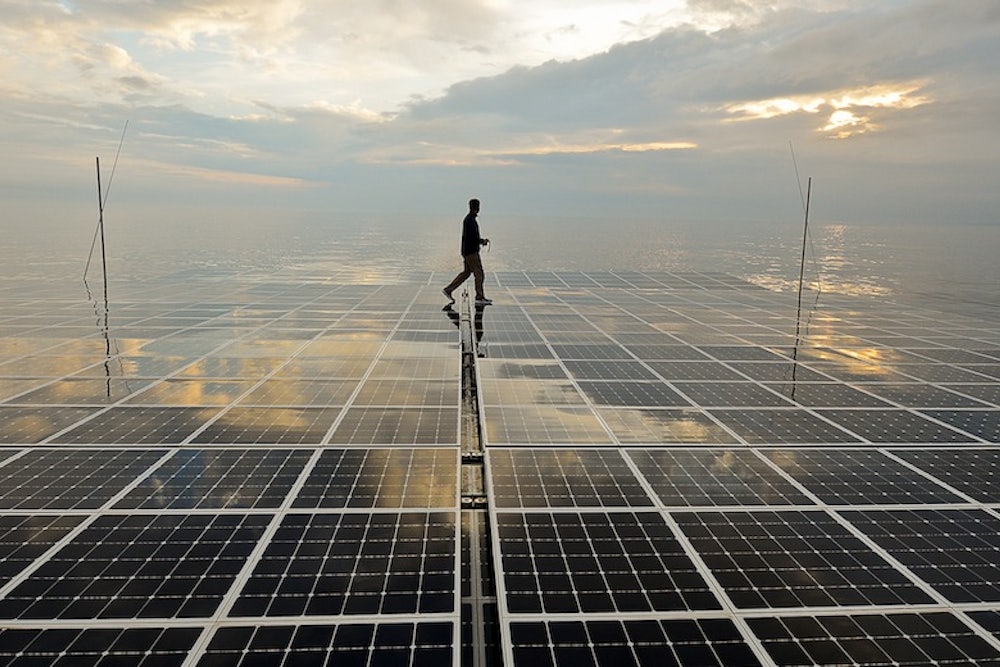Conservatives still use solar energy as a punch line about “crony capitalism.” They might want to start revising their talking points, because two new reports suggest the world could be largely powered by the sun, instead of coal, within decades.
The reports come from the International Energy Agency (IEA). It focuses on two kinds of solar—the kind that’s commonly seen installed on homes and businesses in the U.S. (solar photovoltaic) and the kind that generates heat to power (solar thermal). Within 35 years, according to the reports, they could account (respectively) for 16 and 11 percent of the world’s electricity generation.
It wouldn’t be easy to get to this level. Today, solar accounts for less than 1 percent of global energy consumption and 0.2 percent in the United States. To hit the levels IEA projects, there would have to be substantial investment upfront. But advances in technology, in addition to taxpayer subsidies, have helped solar panel costs come down some 80 percent in the last five years. If the IEA is right, costs may shrink another 65 percent by 2050.
The source of the report is significant. As David Roberts of Grist notes, the IEA has long “been behind the curve, underestimating the growth of renewables. But the IEA also included some big caveats in its projection. Among other things, the IEA says, the growth in solar power won’t happen unless policymakers stop the “policy incoherence, confusing signals or stop-and-go policy cycles,” that discourage investors and entrepreneurs from innovating. An example of this in the U.S. would be the solar investment tax credit, now set to expire in in 2016.
Less pollution is an obvious benefit of embracing solar, but it’s not the only one. Solar creates jobs just like coal does—143,000 of them according to the nonprofit Solar Foundation. Rooftop solar is also saving consumers enough money on electricity bills to make utility companies nervous. Conservatives might object to the idea of solar subsidies, but they ought to appreciate the ways it can help their base.
—Rebecca Leber
News from Monday
VOTING RIGHTS: The justices of the Supreme Court are back from summer vacation. Among their first moves: Allowing reductions in “early voting” for Ohio to take effect. Lyle Dennison breaks down the legal rationale, while Ian Millhiser explains what it means: Less time for voting and, almost certainly, less participation from minority groups. (SCOTUSblog, ThinkProgress)
CONSERVATIVE POLITICS: Tech companies aren't the only ones abandoning the American Legislative Exchange Council. Occidental Petroleum cut ties with the ALEC, presumably because of its position on climate change, after facing pressure from an investor group. (Dustin Volz and Clare Foran, National Journal)
EXTREME HEAT: Yes, you can blame those heat-waves across the world on climate change, according to a report published in the Bulletin of the American Meteorological Society. The connection between climate change and drought is a bit murkier. (Kate Sheppard, Huffington Post)
LONG READ: Ryan Lizza profiles Senator Rand Paul. (New Yorker)
Articles worth reading
Questions about California’s campus rape law. Michelle Goldberg has lots of them. (The Nation)
At least he’s honest. Tom Cotton, who is running for the Senate in Arkansas, is under attack because he voted against the farm bill. His defense? It’s not the subsidies to agribusiness that bother him. It’s the money going to poor people. Jonathan Chait and Greg Sargent ponder what that says about the Republican Party. (New York, The Plum Line)
Stop reading this and go back to sleep. Christie Nicholson writes up a new study, from Finland, which shows that people who sleep more were far less likely to take sick days from work. (Scientific American)
Data problems: Fewer Americans are responding to the Consumer Expenditure Survey that is used to determine inflation. If that trend continues, it could have real problems for how we calculate such things as government bonds and Social Security benefits. (Josh Zumbrun, Wall Street Journal)
A lesson for the president: After watching Obama on 60 Minutes blame the intelligence community for underestimating the Islamic State, Kevin Drum says Obama must learn to admit that he made a mistake. (Mother Jones)
At QED
One year after the healthcare.gov debacle, Jonathan Cohn says Obamacare is hitting its marks—and publishes seven charts to prove it. Danny Vinik looks at the refugee flow into Europe, from Syria, and concludes that the U.S. “border crisis” wasn’t much of a crisis. Elsewhere in the New Republic, John Judis visits Kansas, where Sam Brownback’s efforts to create a conservative utopia have failed so spectacularly that Republicans may lose both both the governor’s mansion and a U.S. Senate seat.
